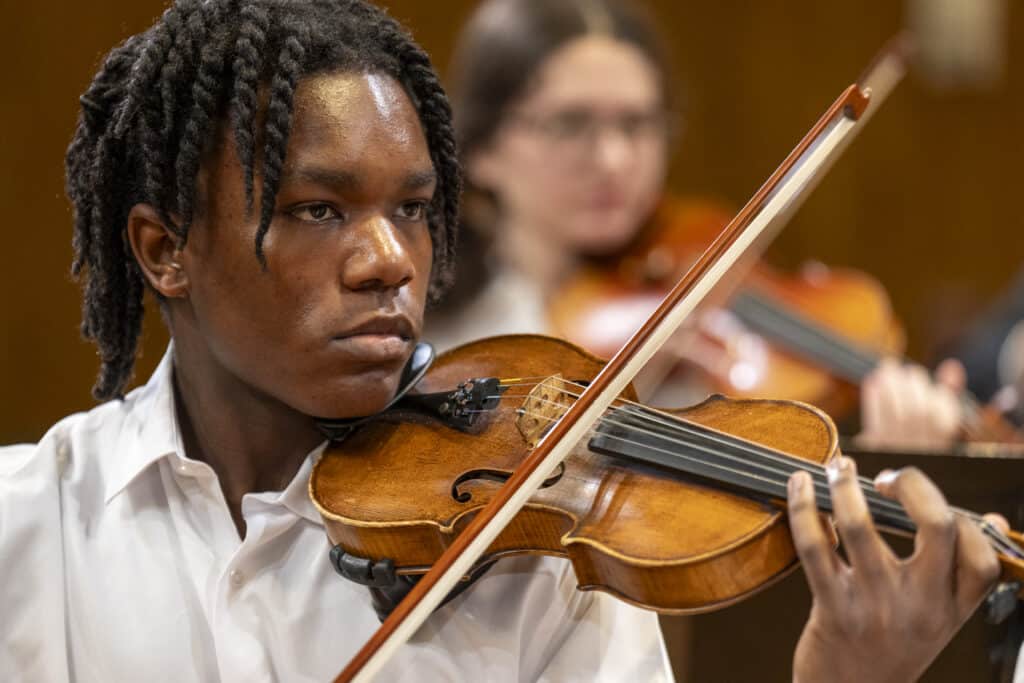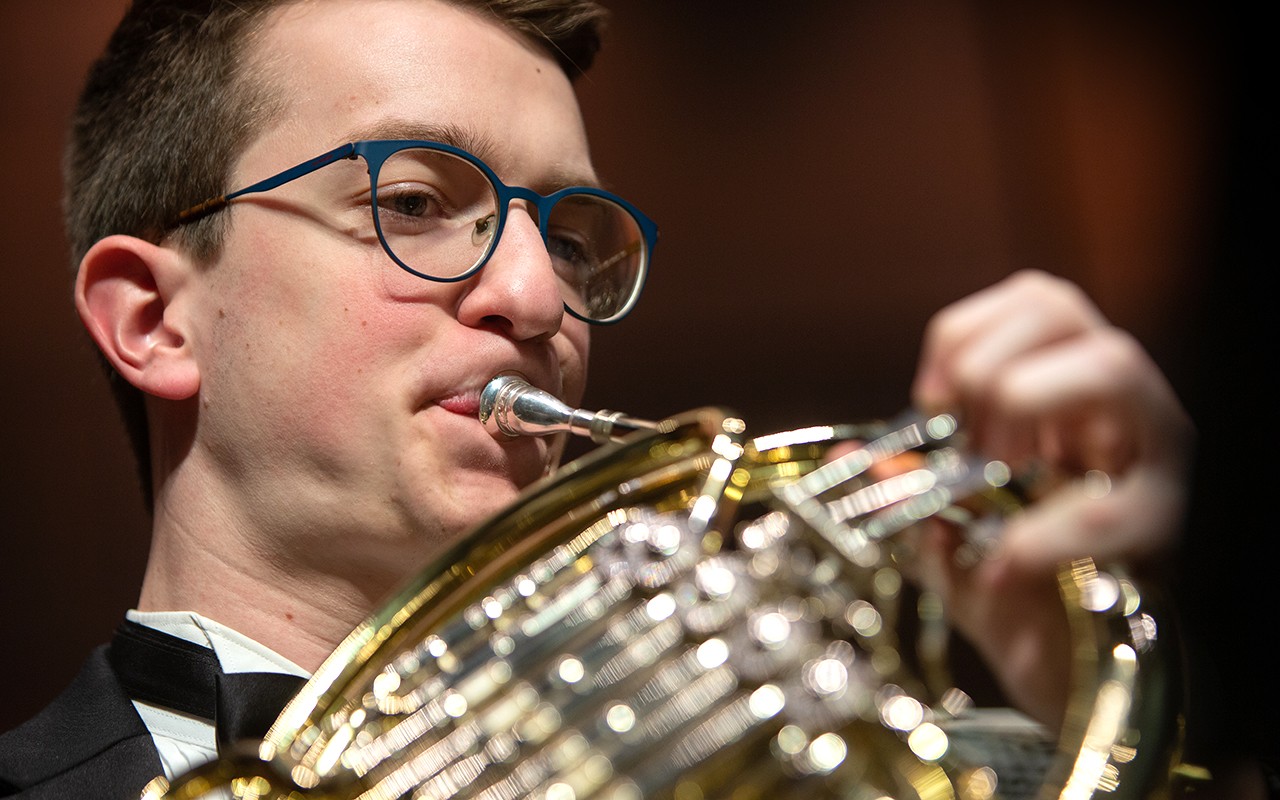Beyond Practice: The Strategic Advantage of Private Music Lessons
The Competitive Advantage Most Student MusiciansOverlook — and Why It Matters More Than Ever in Collegiate Music Admissions and Scholarships.
Read More
AccoladiTeacher.com is designed specifically for performing arts teachers, giving you access to resources that help guide students and their families through every step of the collegiate journey: from school selection and applications to auditions, scholarships, and acceptance.
While teachers are at the heart of this site, we also support students, parents, collegiate and summer enrichment recruiters, and school district fine arts directors. To ensure each community has a dedicated space, we've created tailored websites:
Performing Arts Teachers: this is your home base. Please continue your registration here on AccoladiTeacher.com.
Everyone else: begin your journey at the site designed for your role.

A Guide for Music Students
For high school musicians passionate about both their art and another academic field—be it computer science, business, or psychology—choosing between a double major and a dual degree is a pivotal decision. Understanding the nuances of each path is essential to align your educational journey with your career aspirations. By combining music with another discipline, students can cultivate a unique skill set that opens diverse career opportunities and fosters adaptability in an ever-evolving job market.
Double Major: Pursuing two majors within a single degree program, typically within the same school or college. For example, a student might earn a Bachelor of Arts (BA) with majors in Music and Psychology.
Dual Degree: Earning two separate degrees, often from different schools or colleges within a university, which may require additional coursework and time. An example would be obtaining both a Bachelor of Music (BM) and a Bachelor of Science (BS) in Business Administration.
Combining music with another field can enhance creativity, critical thinking, and versatility.
Graduates can pursue diverse career paths, from performance and education to technology and entrepreneurship.
Employers and graduate programs often value the interdisciplinary knowledge and dedication demonstrated by students who undertake rigorous academic programs.
The following institutions are examples of colleges and universities that offer structured programs for music students interested in pursuing double majors or dual degrees. Please note that this is not an exhaustive list; many other institutions may offer similar opportunities. It’s essential to consult each school’s academic advising resources to understand their specific policies and requirements.
Choosing between a double major and a dual degree is a significant decision that should align with your personal interests, career goals, and educational aspirations. By thoughtfully considering the benefits and challenges of each option, you can tailor your academic journey to best prepare for a fulfilling and dynamic career. Remember, the path you choose should reflect your passions and long-term objectives. Engage with academic advisors, current students, and faculty members to gain insights into the programs that interest you. With careful planning and dedication, combining music with another field can lead to a rewarding and versatile career.
.png) ARTICLE GLOSSARY
ARTICLE GLOSSARY
Academic Advisor: A college or university staff member who helps students choose classes, plan their academic path, and stay on track for graduation.
Bachelor of Arts (BA): A general undergraduate degree that often includes liberal arts subjects; can include music alongside other non-music majors.
Bachelor of Music (BM): A specialized undergraduate degree focusing on intensive music training and performance.
Conservatory: A college or school within a university dedicated to rigorous music training, often with auditions required for admission.
Credit Hour: A unit measuring the amount of classroom time per week for a course. College degrees require a certain number of credit hours to complete.
Curriculum: The structured set of courses a student must take to complete a degree or major.
Degree Program: A structured course of study at a college or university leading to a diploma in a specific field.
Double Major: A college path where a student completes the requirements for two majors under one degree (e.g., Music and Psychology under a BA).
Dual Degree: A college path where a student earns two separate degrees—often from different schools—such as a BM in Music and a BS in Business.
Elective: A class a student chooses freely, outside of required courses, which can reflect personal interests or support a second major.
General Education Requirements (Gen Eds): Foundational college courses in subjects like math, writing, and science that all students must take, regardless of major.
Interdisciplinary: Combining two or more fields of study—like music and business—to develop a broader skill set.
Liberal Arts: A college education approach that includes a wide range of subjects, including humanities, social sciences, and natural sciences.
Major: The main subject area a student chooses to specialize in during college (e.g., Music, Psychology, Engineering).
Mallets: Stick-like tools with padded ends used to play percussion instruments such as marimbas, vibraphones, or timpani.
Marquee: A sign over the entrance of a theater that displays the names of the performers or productions—used metaphorically in the article to mean public recognition or ownership of a performer’s name.
Masterclass: Special class taught by experts in a field, allowing students to learn advanced techniques or skills.
Minor: A secondary subject a student studies in addition to their major, requiring fewer courses.
Performance Track: A music degree path focused on mastering an instrument or voice, often leading to careers in performing or private teaching.
Scholarship: Financial aid awarded to students based on merit, talent (such as musical ability), or need, which does not have to be repaid.
Semester: One half of the academic year, usually lasting 15–18 weeks, during which students take multiple classes.
Time Management: The ability to plan and balance school, rehearsals, practice, and personal life—a crucial skill for double majors and dual degree students.
Objective: Students will be able to explain the difference between a double major and a dual degree, identify key advantages and challenges of each, and research one college or university offering these options for music students, aligning their academic planning with future career goals.
Assignment:
Title: Mapping Your Musical + Academic Future
Teaching Moment
Instructions: (1 & 2 required, select 1 of 3 & 4, 5 required)
Start your college journey with confidence!
Browse our library of helpful articles and directories made just for performing arts students and their families. Whether you're choosing a school, planning campus visits, preparing for auditions, applying for scholarships, or getting ready to submit applications—this is your go-to place for everything college.

.png)
The Competitive Advantage Most Student MusiciansOverlook — and Why It Matters More Than Ever in Collegiate Music Admissions and Scholarships.
Read More
Explore how combining music with another field can open doors to exciting career opportunities.
Read More
Get ahead in your music education journey with strategic dual enrollment opportunities.
Read More.jpg)
Discover proven strategies to build meaningful relationships with college music departments before you apply.
Read More.jpg)
From Baroque to modern, fast to lyrical—contrasting solos reveal a musician's full range in college auditions.
Read More
Discover why mastering just a few bars of music can make or break an audition and reveal your potential.
Read More.jpg)
Make a great first impression with proper college visit etiquette and smart questions.
Read More
A comprehensive roadmap to navigate the music school application and audition process successfully.
Read More.png)
Sometimes the smallest gestures-like a simple thank-you -- open the biggest doors. Discover how one note of gratitude changed everything.
Read More
Discover how college fairs tailored for music students can open doors to top programs and help you make meaningful connections before you ever audition.
Read More
Private music lessons do more than sharpen skills — they unlock opportunity. Discover how one-on-one instruction builds confidence, hones performance, and opens doors to college auditions and scholarships.
Read More
Packed with proven strategies, expert insights, and inspiring real-life stories, it empowers musicians to turn performance anxiety into confident, expressive auditions.
Read More
Discover how marching band can do more than make music—it can open doors to scholarships, leadership roles, and life-changing opportunities.
Read More.jpg)
Where nerves meet opportunity, growth begins. Discover how one powerful experience can elevate your student’s talent—and their college application.
Read More.png)
Professors don't just admit talent—they choose students they won't mind teaching every Tuesday morning before coffee, touring Europe with next spring, and introducing to their colleagues without bracing themselves first.
Read More
Think a music degree is out of reach because of cost? Think again. Whether you're aiming for college scholarships or exploring grants from arts organizations, this guide helps you uncover the many ways to fund your passion — and shows why applying early and often is the key to making your musical dreams a reality.
Read More
From nerves to notes, this guide helps student musicians face audition day with clarity, confidence, and control.
Read More
Shedding light on the financial freedom performing arts students deserve—and the billions in performing arts scholarships many never knew existed
Read More
Talent is just the beginning. Learn how the right moves today—owning your child's UTL name, building their brand, and shaping their story—can set your young performing artist on a path to lasting stardom.
Read More
From first solo to final audition—how a carefully curated repertoire list becomes a student’s personal record of growth, readiness, and artistic identity.
Read More
Don't let travel troubles ruin your big audition! This guide has everything you need to ensure you and your instrument arrive.
Read More
Discover how decoding a composition’s name can elevate your performance, impress adjudicators, and help you stand out from the competition.
Read More
How one meaningful connection with a music teacher can open doors to college, scholarships, and a lifelong mentorship — starting now.
Read More
You don’t need fancy gear to capture talent — just these smart, affordable tips that could turn an audition video into a scholarship-winning performance.
Read More
Discover why a liberal arts education isn’t just about academics—it’s a powerful launchpad for aspiring musicians to thrive in every stage of their careers.
Read More.jpg)
Choosing the right music degree isn't just about a major -- it's about mapping the future of your artistry. Discover the key differences between BM, BA, BFA, and BS programs and find your perfect path.
Read More
From educators, performers, and industry insiders who got tired of hearing “music isn’t a real career” and decided to answer with Broadway box-office receipts, royalty checks, and Grammy paydays.
Read More
Where Purpose Meets Performance: How Service Can Help Pay for Your Music Degree.
Read More
For those navigating the leap from talent to training and tuning both heart and mind to what’s next—this is your guide to finding the path that fits, connects, and inspires.
Read More.jpg)
A month-by-month roadmap designed to help aspiring music majors confidently prepare for college auditions—one scale, solo, and strategy at a time.
Read More.jpg)
Beyond the Name: Finding the Place That Helps You Find Your
Read More.jpg)
Discover the real perks, the hidden costs, and how to tell if coaching is the right
Read More.jpg)
Mastering college applications means mastering deadlines. Success hinges on precision, preparation, and unwavering commitment to each institution’s unique demands.
Read More.jpg)
Because affording your dream school shouldn't be a dream.
Read More
Where passion meets purpose — discover how talented musicians turn their love for music into a professional career serving their country.
Read More.png)
The music industry fuels the U.S. economy, driving schools to recruit creative, business-savvy students. Scholarships now target songwriters.
Read More.png)
How young artists can launch their careers and travel the world — without a college degree.
Read More
Because your talent deserves more than applause, it deserves a paycheck.
Read More
It’s not about impressing—it's about expressing.
Read MoreThe Accoladi Research Team is constantly tracking trends in performing arts collegiate recruiting, documenting scholarship procurement processes, and uncovering new resources for students and families. From the latest audition requirements to insider tips on securing funding, we’re always expanding our library— so, you can make informed choices with confidence.
